Achievements and Announcements
ACHIEVEMENTS
- UniSA’s finest young scientists standing tall in 2019
- UniSA wins international voice on suicide prevention
- Professor Joanne Cys made Honorary Fellow of Australian Institute of Architects
- Innovative women educators awarded Menzies Fellowships
- Malaria-busting research project wins Oxford Uni award
- Work of UniSA graduate showcased at Art Gallery of SA
- UniSA graduates dominate design awards
- Staff win science excellence awards
ANNOUNCEMENTS
- Summary of feedback on Enterprise25 discussion paper now available
- State-of-the-art facility to boost cancer discovery and treatment
ACHIEVEMENTS
UniSA’s finest young scientists standing tall in 2019
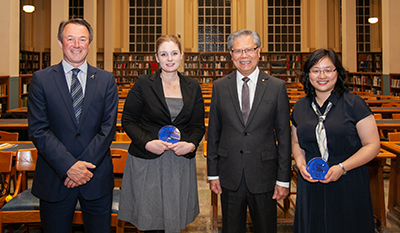 UniSA Deputy Vice-Chancellor: Research and Innovation Professor Simon Beecham, Dr Marnie Winter, SA Governor Hieu Van Le AC and Dr Jia Tina Du at the Young Tall Poppy of Science Awards on 29 July.
UniSA Deputy Vice-Chancellor: Research and Innovation Professor Simon Beecham, Dr Marnie Winter, SA Governor Hieu Van Le AC and Dr Jia Tina Du at the Young Tall Poppy of Science Awards on 29 July.Two UniSA researchers have been named 2019 South Australian Tall Poppies of Science.
Biomedical engineer Dr Marnie Winter and IT behaviouralist Dr Tina Du were among eight South Australian early career researchers honoured by SA Governor Hieu Van Le AC on 29 July.
The Tall Poppy Awards, an initiative of the Australian Institute of Policy and Science (AIPS), recognises achievement in the sciences and helps to communicate the passion and purpose of Australia’s finest scientists.
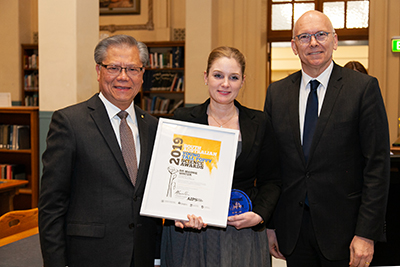 Dr Marnie Winter with SA Governor Hieu Van Le AC and SA Minister for Innovation and Skills, David Pisoni MP.
Dr Marnie Winter with SA Governor Hieu Van Le AC and SA Minister for Innovation and Skills, David Pisoni MP. Dr Marnie Winter, from UniSA’s Future Industries Institute, is using microfluidic technology to isolate fetal cells from maternal white blood cells to help diagnose genetic abnormalities early on in pregnancy, as well as common complications such as pre-eclampsia and stillbirth.
Using lab-on-a-chip technology, Dr Winter can isolate these extremely rare cells – “like looking for needles in a haystack” – which provide important information about the health of an unborn baby.
Dr Winter’s team is hoping to commercialise the technology and make it available to expectant mothers around the world.
“We hope that one day this technology will be routinely used in pregnancies as a first screening stage to flag abnormalities for further testing,” she says.
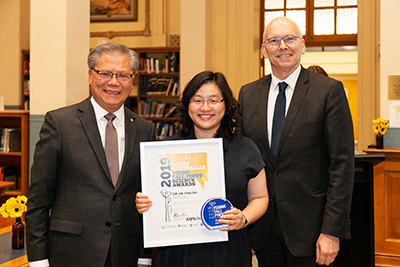 Dr Jia Tina Du with SA Governor Hieu Van Le AC and SA Minister for Innovation and Skills, David Pisoni MP.
Dr Jia Tina Du with SA Governor Hieu Van Le AC and SA Minister for Innovation and Skills, David Pisoni MP. Dr Jia Tina Du is channelling her IT expertise towards meaningful real-world social issues to help vulnerable groups in society navigate the digital world and new technology.
The Senior Lecturer in UniSA’s School of Information Technology and Mathematics is working with Aboriginal communities, older people and migrants to help them access essential services online.
By integrating her expertise in IT with a passion for social justice and equality, Dr Du is gaining international recognition for her work.
In 2018 she won a Women in Innovation Award and is a current ARC Research Fellow. She has also been a visiting researcher at the University of Oxford and Nanjing University.
Video presentations by the finalists in this year’s AIPS Tall Poppy campaign can be found on the SA Government Department for Industry and Skills YouTube channel.
UniSA wins international voice on suicide prevention
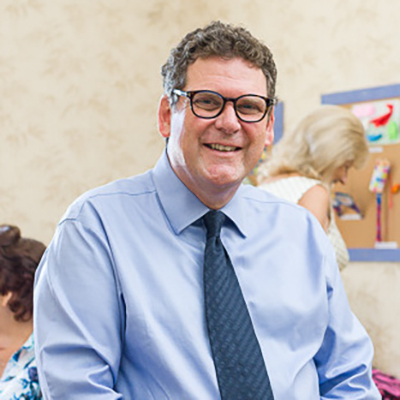
Professor Nicholas Procter has been appointed Australia’s national representative on the International Association for Suicide Prevention (IASP) to 2023.
With members in more than 70 countries, the IASP was established in 1960 and is the largest international organisation dedicated to suicide prevention and to the reduction of suicide-related distress and loss.
Prof Procter says it is a great honour to be elected by his peers to represent Australian research and expertise in the field, internationally.
“Suicide is a significant global health concern with almost one million people a year dying by suicide,” Prof Procter says.
“In Australia there is an average of 8.57 deaths by suicide each day, with rates of male suicide three times higher than those of females.
“Working globally to uncover the best research and practice to prevent suicide is vital.”
UniSA Chair in Mental Health Nursing, Prof Procter leads UniSA’s Mental Health and Suicide Prevention Research Group, which works closely with the government and non-government sector.
The research group has a growing national and international reputation for leading research that relates to the real-world problems of people living with mental distress and at risk of suicide, the needs of carers, and the next generation of health professionals willing and able to support recovery with dignity.
Professor Joanne Cys made Honorary Fellow of Australian Institute of Architects
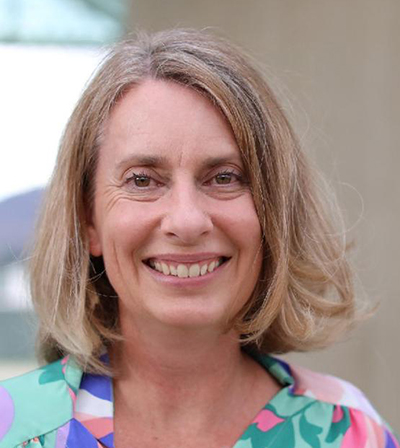
Pro Vice Chancellor, Education, Arts and Social Sciences Professor Joanne Cys, has been named the Australian Institute of Architects’ newest Honorary Fellow.
The award was made in recognition of her “significant and substantial contribution to architecture and interior design in an eminent career that includes being an influential advocate for the role of professional bodies in advancing the standards of architecture, design and design education through collaboration, committee work, speaking and publications”.
Although Prof Cys is responsible for the division of Education, Arts and Social Sciences, her research and engagement continues in interior design – both nationally and globally, focusing on disciplinary sociology of design practice including creative collaborative practices.
“I have worked in interior design and architecture in some way or another all of my working life,” Prof Cys says. “I also work in the area of continuing professional education for designers, I curate design exhibitions and author critical reviews of design projects and catalogue essays for design exhibitions.”
Prof Cys was awarded the fellowship in July, following an endorsement from the Australian Institute of Architects’ national council at its meeting in June.
Honorary fellowships recognise and reward elite members who are “distinguished by scientific, artistic, literary or other eminent attainments in relation to architecture”.
Prof Cys says she was surprised, humbled and honoured to receive the accolade. Her contributions to the design profession have included global, national and local roles with the International Federation of Interior Architects/Interior Designers, the Global Interiors Education Open Forum, the Asia Pacific Space Designers Alliance and the Global Design Forum.
Her advice to the SA Government in 2007-2010 on policy direction and content of SA’s first design strategy Intelligent By Design: A Design Strategy for South Australia, gave rise to the creation of the Integrated Design Commission (now replaced by the Office of Design and Architecture SA (ODASA)).
As National President of the Design Institute of Australia, Prof Cys contributed to the development of a continuing professional education policy for the organisation. In 2010, she was bestowed Life Fellowship of the Institute and in 2016 inducted into the Design Hall of Fame. In 2017 she was named a DIA Design Icon.
Recently she was invited by the International Federation of Interior (IFI) Architects/Designers to review and redesign the IFI’s Education Policy. She will conduct an Education Policy workshop at the IFI 2019 General Assembly and Congress in Dubai later this year.
“I’m leading the work in collaboration with my RMIT colleague, Associate Professor Suzie Attiwill,” Prof Cys says. “We have assembled a global taskforce of leading interior design academics from around the world with whom we are consulting on the project.”
Prof Cys has authored and co-authored numerous publications on interior design and architecture and researched the disciplinary sociology and directions of interior design practice.
Innovative women educators awarded Menzies Fellowships
Two of UniSA’s top women in Aboriginal education have been awarded the Menzies Australia Institute-UniSA 2019 Aboriginal and Contemporary Australian Studies Fellowships, which will see them heading for King’s College in London.
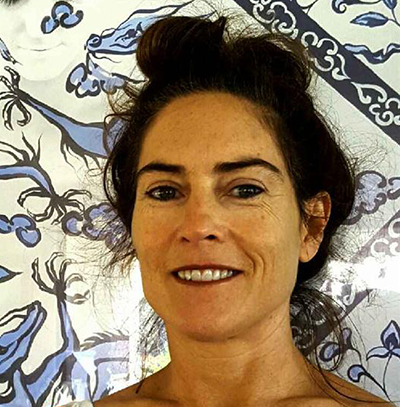
This year’s recipients are Dr Belinda MacGill (pictured right) and Dr Karen Sinclair (pictured below) and both will be involved with research, teaching and public engagement as part of the Fellowship.
Delighted to be working in London, Dr MacGill will focus her teaching and public discussion on how understandings of Australian visual art have been shaped by colonisation.
“Today, non-Indigenous audiences can look at two Australian paintings side by side and have full capacity to understand a conventional image like Tom Roberts’ The Breakaway, but limited tools to engage with important works like Bushfire Dreaming, by Petra Nampitinpa,” Dr MacGill says.
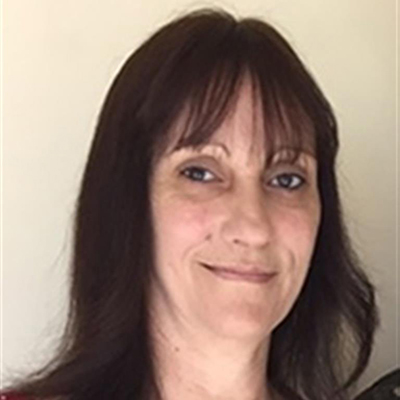
“That kind of comparison is a teaching moment, it compels us to rethink the Australian landscape and its meanings and to understand a bigger view of our environment – free from the omissions, constructions and misrepresentations that have been central to colonial representations of our country.”
A Ngarrindjeri woman and educator, Dr Karen Sinclair says she is passionate about working alongside students to collaboratively broaden understandings about Aboriginal research methodologies and constructions of knowledge.
“I enjoy teaching about Aboriginal knowledges, pedagogies, research methodologies and their associated ethics and protocols and this Fellowship will certainly give me a great opportunity to explore these issues in a new context,” Dr Sinclair says.
Malaria-busting research project wins Oxford Uni award
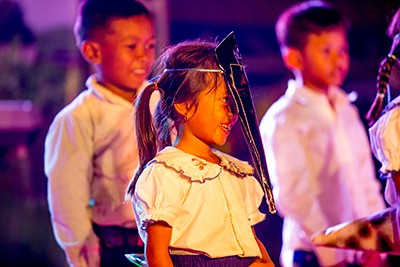 Children dressed as mosquitoes for a drama performance in a Cambodian village. Photo by Nicky Almasy.
Children dressed as mosquitoes for a drama performance in a Cambodian village. Photo by Nicky Almasy.A project involving UniSA researcher Dr Renly Lim and which uses drama, art and music to educate remote Cambodian villagers about the importance of taking anti-malaria pills, has won an award from the University of Oxford.
The project, Village Drama Against Malaria: engaging rural communities in Cambodia, won a 2019 University of Oxford Public Engagement with Research Award.
As the only Australian researcher to take part in the project, Dr Lim and a team of international researchers designed workshops that weaved together entertaining stories using caricatures to drive home the dangers of mosquitoes and convince locals to receive treatment.
Transmission rates for the disease are still high in many rural areas of Southeast Asia, due in part to illiteracy, lack of health services and education and a lack of trust in officials, however this form of educational engagement was a step in the right direction.
High engagement from villagers throughout the series of workshops helped to raise awareness and support malaria elimination.
By using Cambodian drama, which involves comedy and music to tell stories, and incorporating local stories and languages, the project elicited a much better response than a leaflet would have.
University of Oxford’s evaluation showed that active participation, being a performer rather than a more passive audience member, enabled better understanding of the malaria research.
All participants gained valuable knowledge about malaria, its prevention and treatment while the children also had the chance to learn art and theatre and to perform in public.
The project helped to further strengthen relationships between the National Malaria Control Programme and provincial health departments for malaria research and the local school teachers, shop owners and village malaria workers.
Work of UniSA graduate showcased at Art Gallery of SA
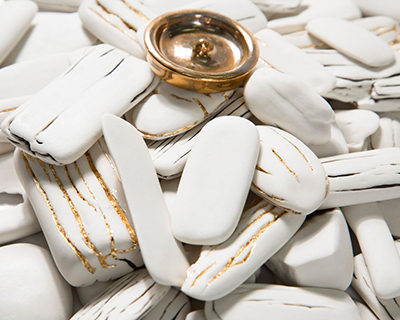 Artwork by Honor Freeman, Midden (all that glitters), 2018, Adelaide, slipcast porcelain, gold lustre, gold leaf (comprised of 191 components), dimensions variable; private collection, courtesy the artist and Sabbia Gallery, Sydney. Photo: Craig Arnold.
Artwork by Honor Freeman, Midden (all that glitters), 2018, Adelaide, slipcast porcelain, gold lustre, gold leaf (comprised of 191 components), dimensions variable; private collection, courtesy the artist and Sabbia Gallery, Sydney. Photo: Craig Arnold.A new exhibition by UniSA-trained artist Honor Freeman has opened at the Art Gallery of South Australia
The exhibition, Ghost objects, is the culmination of research undertaken as part of the Guildhouse Collections Project, a unique venture that supports practitioners to produce new works of art in response to the collections of a range of cultural, historic and scientific institutions.
Coinciding with the opening of the South Australian Living Artists Festival (SALA), Ghost objects was officially launched on Friday 2 August at a seminar event in conversation with the artist and author Annabel Crabb.
Honor Freeman graduated from the South Australian School of Art at UniSA in 2001 with an Honours degree in Ceramics and Glass. Though she has exhibited widely throughout Australia and internationally in several solo and group exhibitions, including a stint as Artist in Residence at Denmark’s Guldagergaard Museum of International Ceramic Art, Freeman remains based in Adelaide and works from her studio to observe, explore and disrupt the ordinariness of the objects that occupy the domestic realm.
UniSA proudly supports the Collections Project and congratulates Honor Freeman on her achievement.
Ghost objects is showing in Gallery 16 at the Art Gallery of South Australia until 29 September.
UniSA graduates dominate design awards
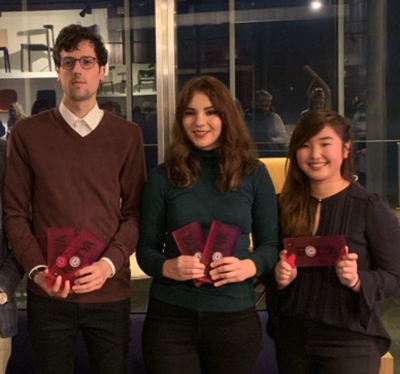 2019 SA/NT GOTYA recipients Joshua Bernardi, Emily Renner and Yin Shan Chee. Photo by Caroline Caneva
2019 SA/NT GOTYA recipients Joshua Bernardi, Emily Renner and Yin Shan Chee. Photo by Caroline CanevaUniSA graduates have taken out all of the awards in the Design Institute of Australia’s SA/NT Graduate of the Year Awards.
The winners of the Design Institute of Australia’s SA/NT Graduate of the Year Awards (GOTYA) were announced on 2 August at a ceremony at Stylecraft’s Adelaide showroom. The program supports and celebrates fresh graduates from around the country in the early stages of their career.
Top graduates across various design disciplines are nominated by their educational institutions each year to be evaluated against rigorous criteria and interviewed by a panel of industry judges to determine the quality of their skills and creative impact.
With nominations across multiple design categories, UniSA graduates took out all the SA Awards, a testament to the hard work of the nominees and academic staff’s ability to produce career-ready graduates.
Emily Renner (Visual Communication), Joshua Bernardi (Industrial/Product Design) and Yin Shan Chee (Interior Design) were each named in the 2019 SA/NT GOTYAs.
Joshua Bernardi was also named the Overall Graduate of the Year for the SA/NT region.
Emily Renner received the high honour of being named the Australian Graduate of the Year in the Visual Communications category, making this the second consecutive year that a UniSA graduate has taken out the national title.
Staff win science excellence awards
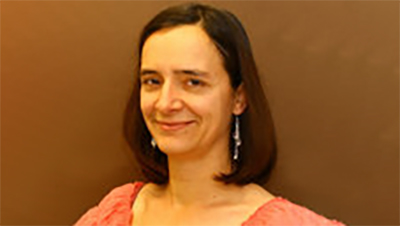
Two UniSA staff have received 2019 SA Science Excellence Awards – one for excellence in PhD research and one for outstanding science, technology, engineering and mathematics (STEM) teaching.
The SA Science Excellence Awards recognise and reward outstanding scientific endeavours, including its application in industry and the advancement of STEM education.
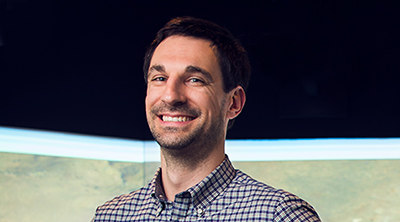
UniSA PhD graduate Dr Dorothea Dumuid (pictured above) received the PhD Research Excellence award for her work in novel statistical models to explore how lifestyle behaviours affect health.
Program Director: Environmental Science and Geospatial Science Associate Professor Tom Raimondo was named STEM Educator of the Year – Tertiary Teaching.
Winners receive a prize to the value of $10,000 to use towards their career development.
The winners were announced in a ceremony on 9 August.
ANNOUNCEMENTS
Summary of feedback on Enterprise25 discussion paper now available
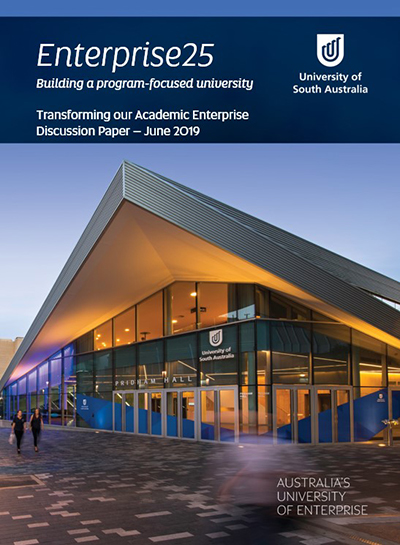
Over the past month the University community has been considering the proposal to build a program-focused university as part of UniSA’s strategic plan, Enterprise25.
On behalf of the University, Provost and Chief Academic Officer Professor Allan Evans thanked everyone who has engaged in the process. This included more than 150 submissions from staff, students, external advisory boards, alumni and industry and government representatives.
The feedback has been reviewed by UniSA’s Senior Management Group and a summary is available on the Enterprise25 website.
State-of-the-art facility to boost cancer discovery and treatment
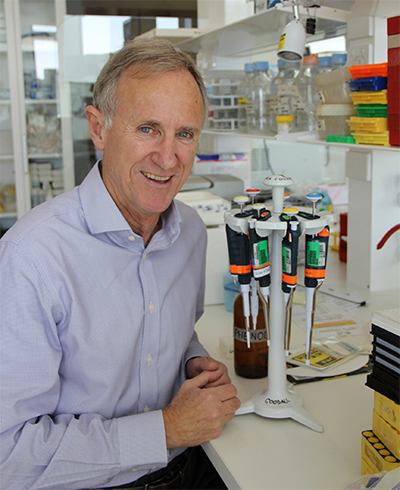
The Centre for Cancer Biology (CCB) has received a significant boost to its cancer research potential with the establishment of a state-of-the-art imaging facility opened this month in the heart of Adelaide BioMed City Precinct.
A $2 million grant from the Australian Cancer Research Foundation (ACRF) has enabled the establishment of the ACRF Cancer Discovery Accelerator at the CCB, a joint alliance between SA Pathology and UniSA.
Research Project Leader and Head of the Gene Regulation Section at the CCB, Professor Greg Goodall, says the facility’s opening will help fuel breakthrough research at the CCB, including the discovery of genes, proteins and regulatory RNAs that promote or suppress cancer.
“Converting these discoveries into actionable targets for drugs requires intimate delineation of the molecular mechanisms within which they operate, in cancer-relevant contexts,” Prof Goodall says.
This new facility will help the CCB find causes and cures for cancer by substantially accelerating the discovery of new therapeutic targets for treating cancers, and understanding the mechanisms that drive cancers to grow and spread throughout the body.
New equipment made possible by this grant includes a ‘Super Resolution’ microscope, which allows structures within cancer cells to be visualised at a resolution 10 times that of conventional optical microscopes. This will enable researchers in SA to investigate abnormalities associated with cancer cells in great detail.
View the full announcement on the UniSA Media Centre.
Other Stories
- A midnight snack might be the key to working overnight
- Memory warning to those wanting to spice up their lives
- Study indicates causal link between obesity and multiple diseases
- Dragonflies are helping make driverless cars safer
- From the Vice Chancellor
- Achievements and Announcements
- Sixteen images that will change how you view research
- Technology preventing hospital falls explained through animation
- Refurbished spaces for Aboriginal students open at City East and Magill
- Healthy lifestyle may counteract genetic risk of dementia
- Video: See highlights from the first six months of 2019
- UniSA visual artist represented on world stage at Cairo Biennale
- Students and staff to provide a ‘hand up’ to help the homeless
- The latest books from UniSA researchers
- UniNationals and Crows lunch




